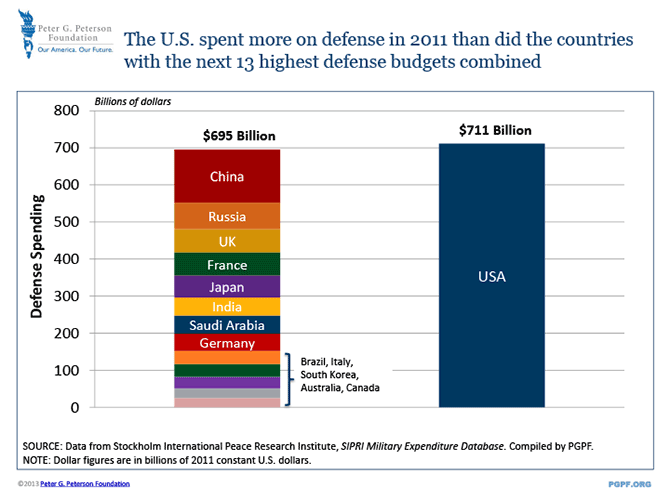You are here
Should Defense Spending Cuts Be Part of Any Deficit Reduction Package?
As policymakers consider how best to address our looming fiscal challenges, there is a growing debate about whether the U.S. can reduce defense spending without jeopardizing its national security.
Mindless cuts to defense could be dangerous, but there is room in the defense budget to make sensible reductions. This year, the federal government spent about $700 billion on national defense, which is the second largest item in the budget after Social Security.
The Stockholm International Peace Research Institute estimates that the U.S. spent more than the defense budgets of the next thirteen highest-spending countries combined.

Moreover, many experts agree that the United States enjoys unprecedented global military superiority, with capabilities far exceeding that of any potential rival, today and for years to come. The U.S. armed forces are able to project power across the globe, and can strike quickly and lethally against enemy targets.
Changes in the international security environment since the end of the Cold War, as well as the drawdowns in Iraq and Afghanistan, allow for a rethinking of the country’s global engagement strategy — and could produce significant savings for the federal budget. However, any changes in defense spending should be guided by a strategy that identifies the country’s interests, potential threats to those interests, and the best military and diplomatic methods for countering those threats. And that strategy should take account of our country’s military superiority, the difficulties of waging protracted land wars, and future threats to our security that come from non-state actors.
The Budget Control Act (BCA) of 2011 requires large cuts to defense over the next decade. First, the BCA imposes nominal dollar spending caps on defense that began in 2011. In addition, because the supercommittee failed to reach agreement on an additional $1.2 trillion in savings through 2022, the budget will undergo further reductions on January 2nd, 2013. For defense, that means that most defense resources will be cut by about 10 percent, according to the Congressional Budget Office — or $55 billion in 2013. These cuts are not based on achieving any particular strategic vision. Instead, they are imposed mechanically across the defense budget, which could result in reductions to programs critical for national security.
